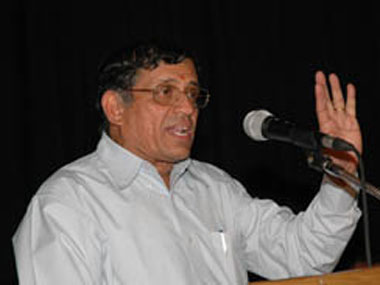Why is there a hue and cry on S Gurumurthy’s
appointment to the board of the Reserve Bank of India (RBI)? Perhaps, it is his background, or his views on major economic issues under the Narendra Modi regime that are mostly in-line with what the government thinks from time to time. Gurumurthy is a well-known RSS-ideologue, a chartered accountant, a newspaper columnist who writes mostly on economic and corporate issues, and also the editor of Tamil political weekly Thuglaq. Gurumurthy’s views on economic affairs have largely echoed the Modi-led government’s stated stance. For instance, he has been a big supporter of the controversial demonetisation drive, announced by Modi in November, 2016. [caption id=“attachment_534726” align=“alignleft” width=“380”] A file photo of S Gurumurthy. Reuters[/caption] Gurumurthy consistently described the biggest disruptive move the Indian economy has witnessed in a long time as a great economic policy that can break the back of the black money network, corruption and all other stated objectives. Even after a year, when critics went to town shouting out the failure of demonetisation in unearthing black money, killing corruption and cutting the flow of fake notes, Gurumurthy still continued to support the note ban, saying “its fundamental aims were many” and that the move has “terminated the asset price-led, spurious jobless growth and averted a crisis in the making”. Again, Gurumurthy was one of the first persons who spoke about the RBI’s plan to use Rs 2,000 notes as a temporary arrangement to boost liquidity in the system following the demonetisation-resulted cash crunch. In December 2016, a month after demonetistation, Gurumurthy had said that rolling out Rs 2,000 notes was a stop-gap arrangement for the immediate period post-demonetisation. “In the short time of two months you do not have time to print Rs 500 and Rs 1,000 notes. This 2,000 rupee note must be phased out … Demonetisation is not a one-stop solution for black money. This requires a very major agenda… The nation is rebooting,” Gurumrthy was quoted as saying. Gurumurthy has never been a friend of the RBI. In fact, he has had face-offs with the institution on a range of issues. Take the example of banks’ bad loan clean-up. Gurumurthy has been opposing the way the RBI, under Raghuram Rajan, carried out the bank NPA clean-up process, saying it will break the back of PSU banks given the manner in which the battle was being fought. Further, Gurumurthy has supported the idea of the RBI using its capital reserves for recapitalisation of India’s ailing state-run banks. To cut it short, Gurumurthy has been an ardent supporter of most government policies and development programmes like MUDRA scheme except rare occasions. So does this mean Gurumurthy will now be the government-supporting voice on the RBI board and will influence its decisions? Not likely. A directorship on the RBI’s board doesn’t come with any executive powers that can influence the central bank’s course on its core functions. It is, at best, a decorative position. The person can at best be a part of issues that concern the RBI as an institution and with respect to its relation with other constitutional entities. The RBI governor has command over the board’s decisions in most cases. There isn’t much merit in arguments that cite Gurmurthy’s lack of experience in the banking sector. Y H Malegam, one of the most respected people to have served on the RBI board. and as a member on various important RBI committees, was also a chartered accountant. One can call Gurumurthy’s nomination by the central government a political appointment. But, that way, all appointments by the government can be termed political in one sense or another. “If Gurumurthy’s qualifications and political/ideological leniency is up for debate, so will be several other previous appointments to the RBI board and other equally constitutionally important institutions,” a former deputy governor of the RBI told this writer. He indeed has a valid point.
A directorship on the RBI’s board doesn’t carry any executive powers that can influence the central bank’s core functions.
Advertisement
End of Article


)
)
)
)
)
)
)
)
)



